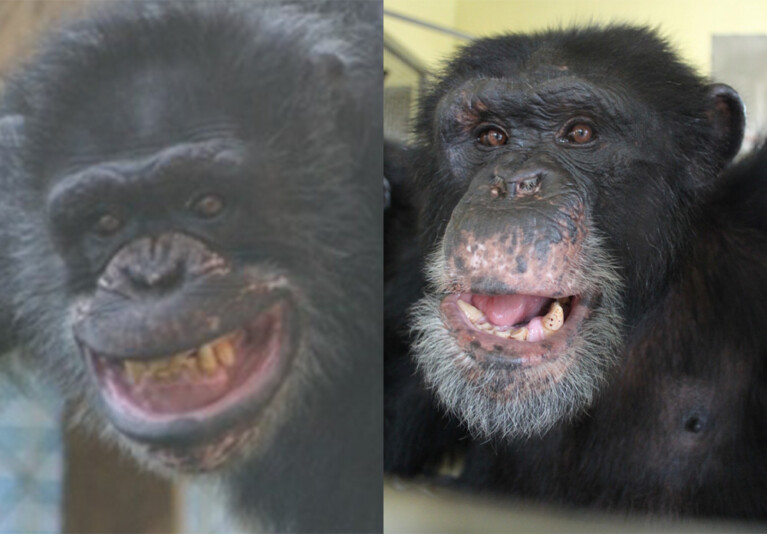Chimpanzees used in entertainment are exclusively infants and juveniles, as chimpanzees become impossible to control and handle around the age of 8 years old. Under natural circumstances, young chimpanzees rely on their mothers and nurse until they are around 5 years old. Instead, chimpanzee actors are removed from their mothers at birth, trained to perform unnatural behaviors, and face short acting careers and uncertain futures.
Chimps bred for the entertainment industry are typically taken from their mothers at birth. Baby chimpanzees can be easily distinguished by their small body size, as well as pale faces and ears. Like humans, chimp babies are virtually helpless in their infancy, unlike other mammals who learn to walk within days of their birth. For chimpanzees, the first five years of life are critical for social bonding, learning from their mothers, and healthy psychological development. Chimpanzees in entertainment lose these opportunities, and are instead trained to perform unnatural and often uncomfortable tricks, such as walking upright and riding bicycles, which strain their bodies. Human-reared chimpanzees additionally tend to suffer from abnormal behaviors, such as repetitive rocking and hair plucking.
Once young chimpanzees reach maturity and become too strong to control, they can no longer be used by trainers in the entertainment business. Many are sold to unaccredited roadside zoos, and the pet trade; few make it to accredited sanctuaries. The ones who do make it to sanctuary often struggle to live with other chimpanzees, as they never learned how chimps behave from their mothers.

One of the most commonly misinterpreted chimpanzee behaviors is their smile. Though many chimpanzees are featured in films, television, and greeting cards with grins that expose all their teeth, this is actually called a “fear grimace.” A fear grimace is an instinctual reaction to fear or intimidation. When chimpanzees smile, they cover their top row of teeth in a distinct way. As you can see in the image, Spike smiles during a play session with a caregiver. At right, Abdul fear grimaces upon being released onto his island habitat for the first time. Many chimpanzees initially experience anxiety and stress when moved into a new environment. This is short-lived, as chimpanzees tend to quickly adjust and enjoy their new sanctuary setting.
Meeting the needs of these intelligent, active, and highly social primates in captivity is incompatible with the training methods used to teach them to perform unnatural behaviors and tricks. Many training facilities have been exposed by whistle-blowers, as their training methods were forceful and abusive. It is common for chimpanzee trainers to use coercive training methods, as chimpanzees are incredibly strong and difficult to control. Save the Chimps’ Advisory Council members Dr. Jane Goodall and Anjelica Huston are among the high-profile voices who have spoken out against the exploitation of chimpanzees in entertainment.
Save the Chimps encourages our supporters to help in ways they can. Please do not watch movies or television that features exploited chimpanzees performing tricks, interacting with other species of animals, used as photo props, “smiling” with a fear grimace, or in unnatural settings. Many individuals also reach out to companies who use chimpanzee actors in film and advertisements to politely urge them to remove chimpanzees from their work and vow to refrain from using primates in the future. A few examples of companies who have pulled advertisements featuring chimpanzee actors due to public outcry are Captial One, Pfizer, Dodge, Samsung, and Sprint. These companies have all pledged to never use great apes in their work in the future.
There are, however, a few positive ways to view chimpanzees in media, such as documentaries featuring chimpanzees non-invasively observed in their natural habitats and in sanctuary settings. Several companies sell beautiful greeting cards and postcards featuring chimpanzees photographed in the wild. Sanctuaries also sometimes sell greeting cards displaying their residents living comfortably in retirement.
With the 2015 U.S. Fish and Wildlife decision to classify all chimpanzees as Endangered, we are hopeful that the exploitation of this highly threatened species will cease. Chimpanzees deserve the opportunity to grow up with the comfort of their mothers, the ability to express natural behaviors, companionship with their peers, freedom from exploitation, and dignified retirement in accredited sanctuaries.
Meet our chimpanzee residents that were rescued from the entertainment industry and support them with a symbolic adoption.

